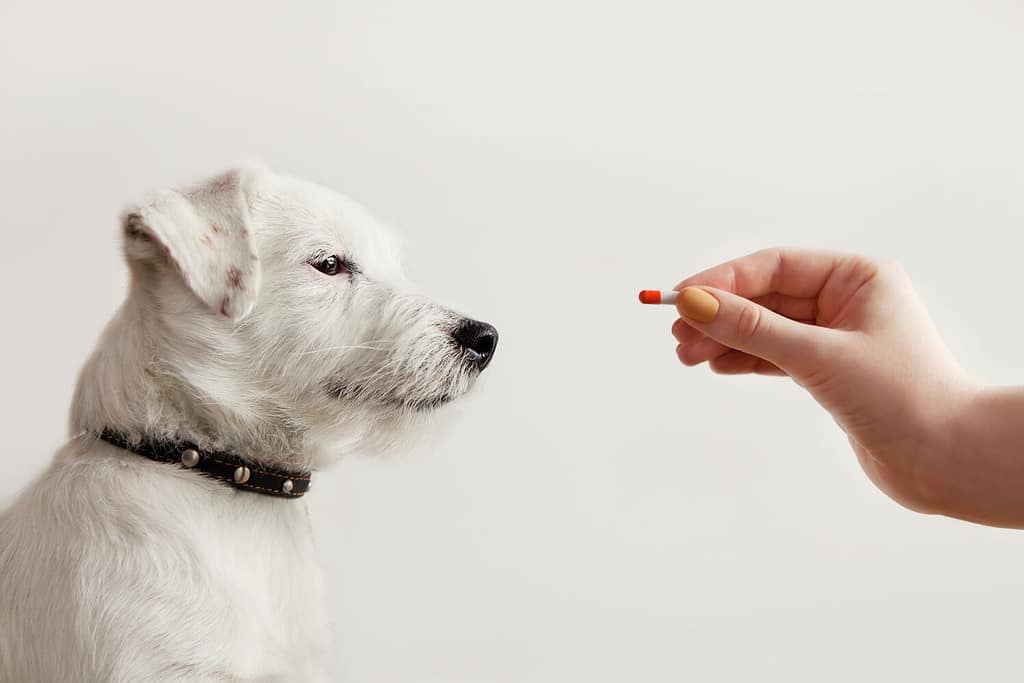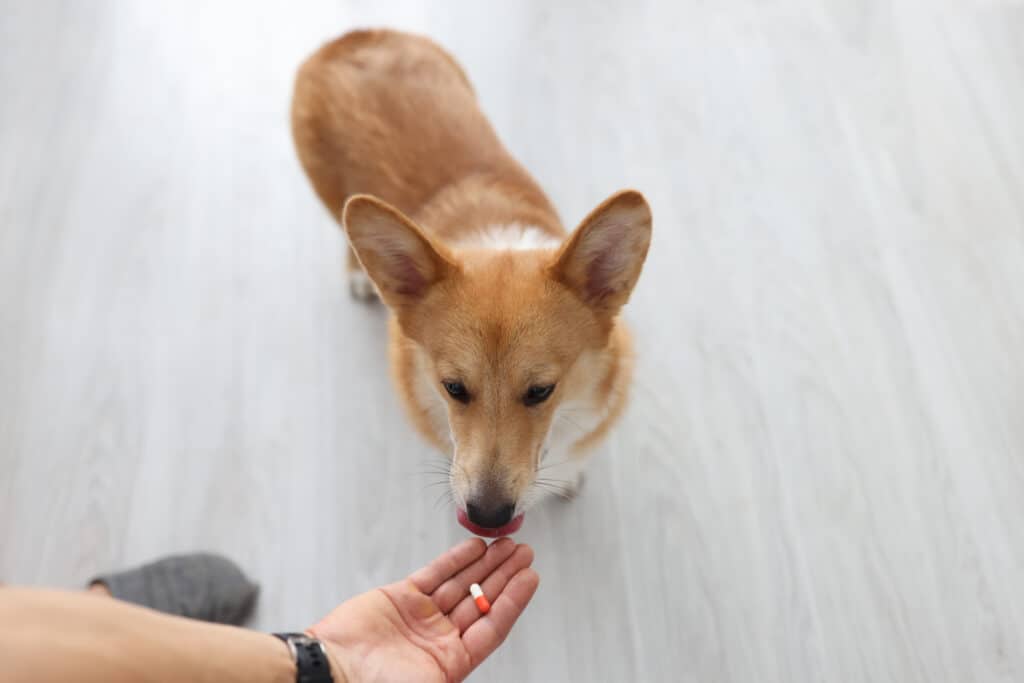Has your veterinarian prescribed acepromazine for your stressed out pup? You likely have questions about this medication and how it works, so let’s break down everything you need to know about acepromazine for dogs below!
What Is Acepromazine?

Acepromazine is now exclusively used as a tranquillizer/sedative for animals.
©Liudmyla Guniavaia/Shutterstock.com
Acepromazine, or “ace”, is a medication used to sedate cats and dogs. It is a phenothiazine derivative antipsychotic medication that was once used in human medicine, but it is now exclusively used as a tranquillizer and sedative for animals. Acepromazine has a rapid depressant effect on a dog’s central nervous system, leading to sedation and muscular relaxation within 15 to 20 minutes of administration.
Is Acepromazine Safe For Dogs?
Acepromazine is safe for dogs when following your veterinarian’s dosing guidance. While you should always follow your vet’s dosing guidance closely, it’s even more important when dealing with sedatives like acepromazine. It’s also essential to only give your dog the form of acepromazine that you purchased from your vet’s office.
Why Do Dogs Take Acepromazine?

Acepromazine is often used to sedate for vet exams, small procedures, grooming, and even stressful events.
©megaflopp/Shutterstock.com
Vets prescribe acepromazine to dogs in situations that benefit from sedation. Some of the most common reasons why dogs take acepromazine include:
- Sedation for a vet office exams or diagnostics
- Sedation for a stressful event
- Sedation for surgical recovery
- Sedation for grooming appointments
- Preventing motion sickness
It’s important to keep in mind that while acepromazine will sedate your canine friend, this medication does not have any pain control effects. Acepromazine will be prescribed alongside other pain relief medications if your dog is undergoing a painful procedure, or if they are recovering from one.
How Do I Give My Dog Acepromazine?

Acepromazine tablets should be given 45 minutes before the stressful event.
©Jaromir Chalabala/Shutterstock.com
Acepromazine can be found in pill and injectable form, but veterinarians will only send home the oral form of acepromazine. Your vet will recommend giving their acepromazine dose 45 minutes before the stressful event starts to allow plenty of time for sedation. Injectable acepromazine will only be administered in your vet’s office.
What Is The Dose Of Acepromazine For Dogs?
Before we offer the standard dose for acepromazine use in dogs, we should state again that you should never give your dog acepromazine without veterinary approval. With that in mind, there is a standard acepromazine dosing range that most veterinarians prescribe!
The standard dosing range for acepromazine use in dogs is 0.5 to 1.5 mg per pound of body weight. The final dose will vary based on the reason the dog is being sedated, how hyperactive or aggressive the dog is, and how well the dog responds to the sedative.
Dr. Amy Nicole Lewis, a veterinarian with Worldwide Veterinary Services told A-Z Animals that dog breeds with the MDR1 gene are more sensitive to acepromazine and require a much smaller dose than other dogs. Some of the dog breeds with the MDR1 gene include collies, sheepdogs, and any collie-sheepdog mixes.
Does Acepromazine Cause Any Side Effects In Dogs?

Common side effects of acepromazine use in dogs include confusion, lethargy, wobbly gait, reverse sneezing, and chewing movements.
©Varvara Serebrova/Shutterstock.com
Acepromazine should only be used when your dog can be carefully monitored after administration. Due to acepromazine being a tranquilizer, most side effects involve sedation or disorientation. Some of the most common side effects seen with acepromazine use in dogs include:
- Lethargy
- Weakness
- Confusion
- Wobbly gait
- Reverse sneezing
- Chewing movements
- Seizures
- Hyperactivity
- Aggression
We always suggest reaching out to your vet if you are worried about your little one’s acepromazine side effects. Your vet may be able to adjust your dog’s dose if they are highly sensitive to the sedative effects.
Is Acepromazine Ideal For Plane Travel With My Dog?
If you are planning to bring your dog along on your future travels, then you may be looking for a safe sedative option to ease their nerves. While acepromazine is an effective sedative tool for stressful events, many vets would rather rely on medications like trazadone and gabapentin for travel. However, every vet is different, so we suggest getting your vet’s input on what’s best for your dog.
Always get approval from your vet before sedating your dog for travel.
How Do I Get Acepromazine For My Dog?
Acepromazine is a sedative and tranquilizer that can be used before vet exams, grooming trips, stressful events, and more. Acepromazine is a powerful sedative that can only be purchased at your vet’s office, so we suggest reaching out to your vet team if you think your dog can benefit from the use of acepromazine.
Ready to discover the top 10 cutest dog breeds in the entire world?
How about the fastest dogs, the largest dogs and those that are -- quite frankly -- just the kindest dogs on the planet? Each day, AZ Animals sends out lists just like this to our thousands of email subscribers. And the best part? It's FREE. Join today by entering your email below.
Thank you for reading! Have some feedback for us? Contact the AZ Animals editorial team.








